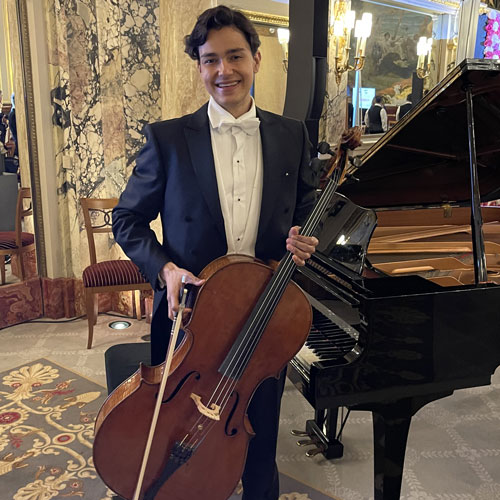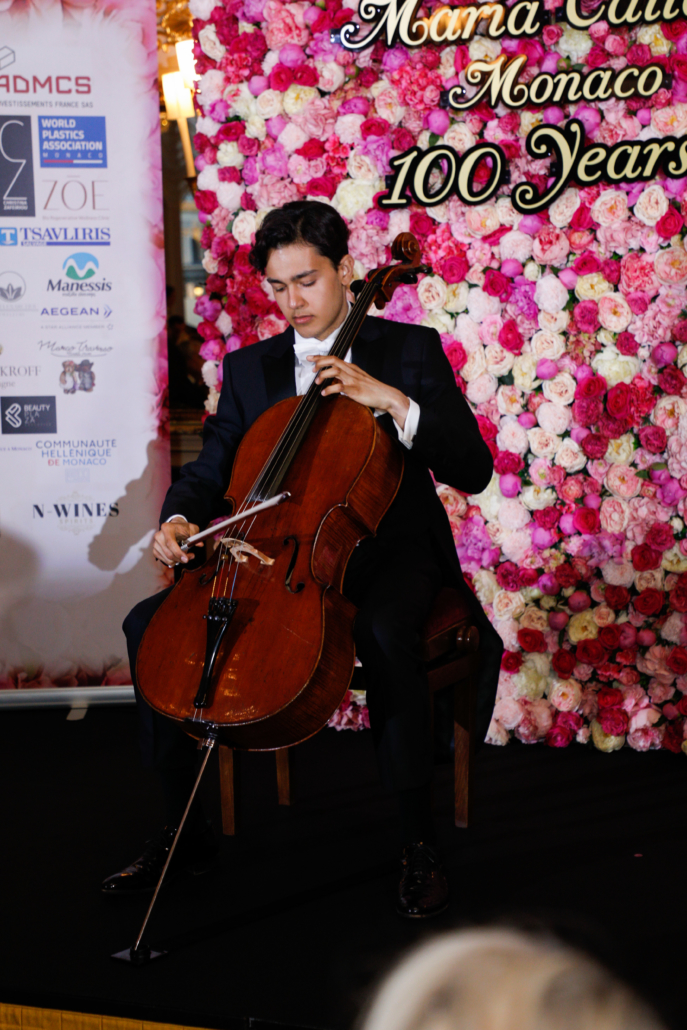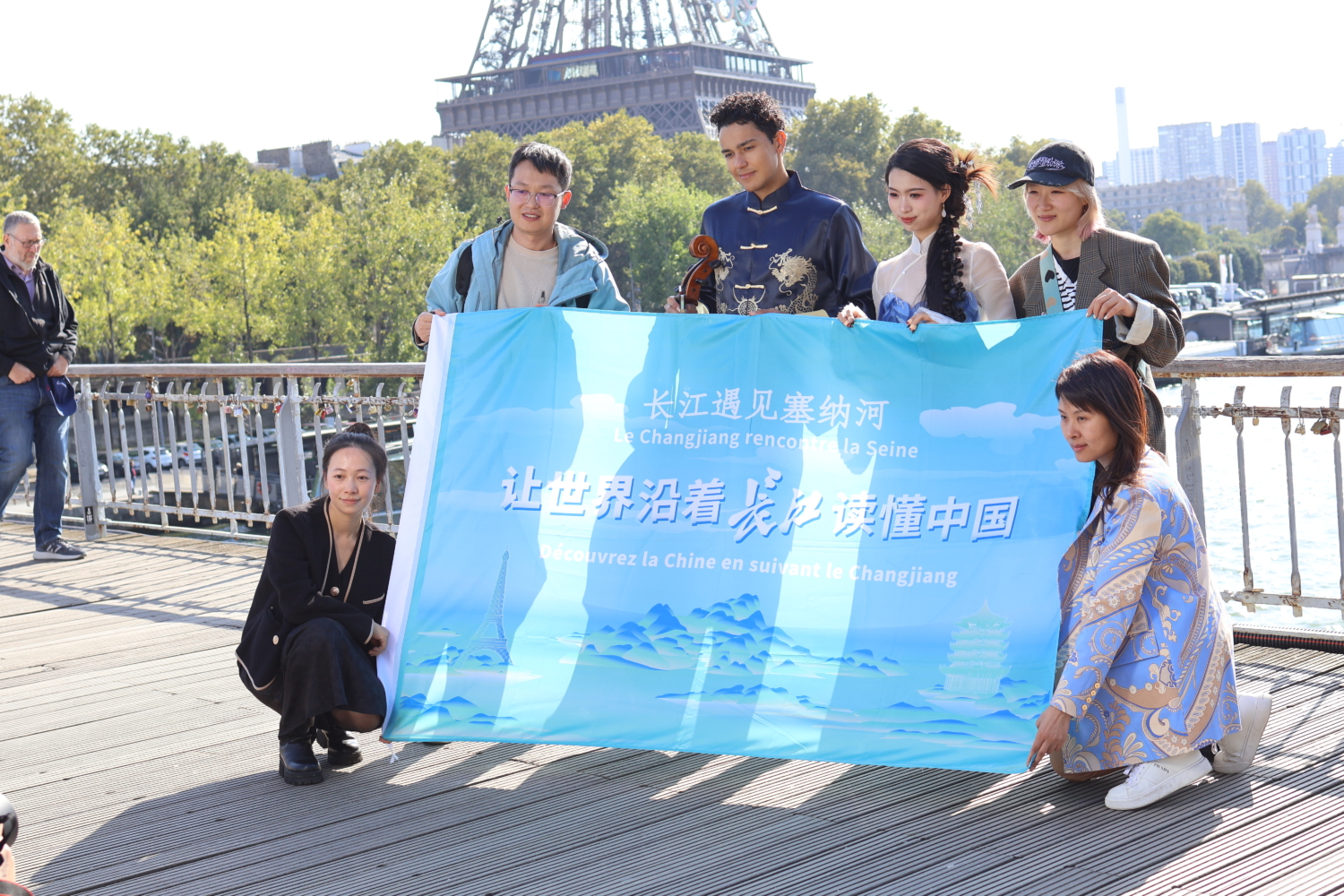Benjamin Jacobs is only 23 but has already plenty of experience as a concert and solo cellist. He won his first competition at the age of seven. He was born into a family of music lovers – his father is an amateur jazz pianist, and his mother played classical piano. His parents encouraged him to pursue music from a young age. Following the example of his brother who played violin, he took up the cello and, he says, it was as if he physically merged with the instrument – “I remember that, from the very first time I tried it, the cello fused with me and took over my life. It was an almost carnal connection. The instrument fit my personality and, I would say, became an extension of my body.”
Growing up in Lausanne, his musical education unfolded in the Swiss city, the Olympic capital and home of the IOC. Benjamin studied at the Lausanne Conservatory, where he crossed paths with Susan Rybicki-Varga, daughter of violinist Tibor Varga, who became his teacher and confidant for over ten years. “Before starting my current professional training, she was, without a doubt, the teacher who shaped me the most. She always treated me as more than a music student; she understood me on a human level. She tailored her teaching to match my natural development at an age when it is not always easy to persevere with the discipline required to become a true musician. Without her, I would certainly not be in my current position.”
Benjamin obtained his conservatory certificate with brilliant results and commendations from the jury in 2016; he achieved his International Baccalaureate in 2018 and his Bachelor of Music from the Haute école de musique de Vaud in 2021. From there, the young cellist went professional. The world opened up to him when he was accepted at the Royal College of Music in London, a British institution that is famed for offering students much practical experience. Under the supervision of Professor Raphael Wallfisch, he obtained his Master of Arts in Music Performance with a distinction in July 2023.
Throughout his years dedicated to music, Benjamin has always performed in concerts, often as a soloist, which he prefers. “Playing cello means two things to me. It helps me process my thoughts, like a sort of meditation that gives form to my emotions. This is inseparable from the desire to share it with others. The most important thing for me is to balance what music brings to me and what it brings to the audience.”
Where does Benjamin draw his musical inspiration from? No matter how often he is asked, he always replies in the same way: “I have always resonated with the romantic period. I love Brahms as well as Schumann, especially for the sincerity that can be found in his music and the raw expression of his various personalities.” There is no need to look further than the heart being at the root of these particular affinities. When probed further, the cellist demonstrates his openness to all sorts of music because he also adores Dmitri Chostakovitch: “I have always loved the core energy of his music, which draws on the classical tradition but uses contemporary motifs and reflects the tragic era during which he lived and worked.” Within the realm of the visual arts, Benjamin is particularly drawn to impressionism, in which he can immerse himself entirely. It evokes the pictorial music of Claude Debussy and the non-conformist Erik Satie. He sees an interdisciplinary link between that period’s music and art. Closer to our times, he is fascinated by the composer and musician Ernest Bloch. After discovering him, Benjamin devoted his Bachelor’s thesis at Lausanne to studying the composer. Benjamin says, “he is the composer with whom I have developed the closest personal connection. The propensity for the cello’s natural resonance to so closely emulate the human voice is what continues to fascinate him.
In 2022, Benjamin performed together with the Russian harpist Alexander Boldachev for the Soirée Favorit at the Beau-Rivage Palace in Lausanne. Building from this the following year, he was honoured to have the unique opportunity of sharing this with his audience at the Maria Callas Monaco Gala & Awards 100 Years ceremony, 3rd edition, Under the High Patronage of His Serene Highness Prince Albert II of Monaco, as he played the great aria from Donizetti’s L’Elisir d’amore: Una Furtive Lagrima.
For the 2023-2024 season, Benjamin was awarded a scholarship by the Vevey Spring Festival, where he will be mentored by the international cellist Daniel Müller-Schott and Wilson Hermanto (principal guest conductor of the Cameristi Della Scala). In November, he performed Vivaldi’s Concerto in G minor for 2 cellos together with Daniel Müller-Schott at the prestigious Royal Savoy Hotel in Lausanne. This was shortly followed by his “Young Talents” concert in 2024, inviting his good friends to create a memorable event. This included ex-principal dancer of the Béjart Ballet Jia Yong Sun, and Valerija Frank (Béjart Ballet), to choreograph dances for his interpretation of J.S. Bach’s Cello Suite No.3 in C Major. Benjamin then took on works from Brahms and Saint-Saëns with the gifted pianist, and winner of the 2023 Clara Haskil competition, Magdalene Ho.
In May 2024, for the official Soirée III of the Vevey Spring Festival season closure concert, Benjamin interpreted Brahms Cello Sonata no.1 in e minor together with Magdalene Ho, in the famous Salle del Castillo, located on the shores of Lake Geneva, Switzerland.
Since then, Benjamin has been working on developing his career and musical projects in new and intriguing avenues, continuing to explore the creative possibilities that classical music can offer to its public in a multi sensorial experience. In this prospect, Mischa Damev invited him to take part in the 78th edition of the Septembre Musical Montreux-Vevey – a festival which, this year, was conceived as a creative laboratory celebrating daring creativity and innovation in classical music. For this occasion, Benjamin invited his co-partner Jiayong Sun for an interpretation of works which would transport the audience, under the theme: « From Schindler’s List to classical music ».
Benjamin’s recent highlights include performing in the « SHOW Culturel du Yangtze à Paris, » a promotional film aimed at fostering global cultural understanding of China’s Yangtze River. Organised by the Comité pour le Développement des Echanges Franco-Chinois, the project featured renowned artists from around the world, including guzheng virtuoso Peng Jingxuan from Wuhan, China.
In addition to his professional pursuits, Benjamin actively seeks to support community causes through his craft. Notably, he performed at the National Museum of Egyptian Civilisation and Al Masa Hall in Cairo, Egypt, as part of the 2024 Hope Giver Campaign closing ceremony.


